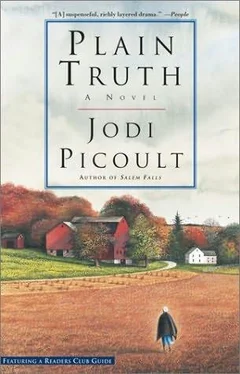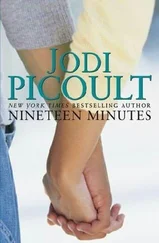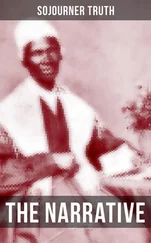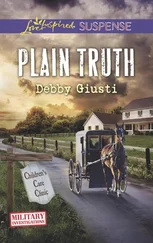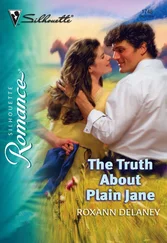“He went into Philadelphia. He’ll be back tomorrow, for the trial.”
“You came to tell me this?”
“No,” Samuel answered. “I came to take you for a walk.”
She lowered her gaze. “I don’t figure I’d be very good company right now.”
He shrugged when Katie didn’t answer. “Well, I’m going, anyway,” Samuel said, and started down from the porch.
“Wait!” Katie cried, and she hurried to fall into step beside him.
They walked to a symphony of wind racing through trees and birds lighting on branches, of owls calling to mice and dew silvering the webs of spiders. Samuel’s long strides made Katie nearly run to keep up. “Where are we going?” she asked after several minutes, when they had just reached the small grove of apple trees.
He stopped abruptly and looked around. “I have no idea.”
That made Katie grin, and Samuel smiled too, and then they were both laughing. Samuel sat, bracing his elbows on his knees, and Katie sank down beside him, her skirts rustling over the fallen leaves. Empire apples, bright as rubies, brushed the top of Katie’s kapp and Samuel’s brimmed hat. He thought suddenly of how Katie had once peeled an apple in one long string at a barn raising, had tossed the skin over her shoulder like the old wive’s tale said to see who she would marry; how all their friends and family had laughed to see it land in the shape of the letter S.
Suddenly the silence was thick and heavy on Samuel’s shoulders. “You’ve sure got a good harvest here,” he said, removing his hat. “Lot of applesauce to be put up.”
“It’ll keep my mother busy, that’s for certain.”
“And you?” he joked. “You’ll be in the barn with us, I suppose?”
“I don’t know where I’ll be.” Katie looked up at him, and cleared her throat. “Samuel, there’s something I have to tell you-”
He pressed his fingers against her mouth, her soft mouth, and let himself pretend for just a moment that this could have been a kiss. “No talking.”
Katie nodded and looked into her lap.
“It’s near November. Mary Esch, she’s got a lot of celery growing,” Samuel said.
Katie’s heart fell. The talk of November-the wedding month-and celery, which was used in most of the dishes at the wedding dinner, was too much to bear. She’d known about Mary and Samuel’s kiss, but no one had said anything more to her in the time that had passed. It was Samuel’s business, after all, and he had every right to go on with his life. To get married, next month, to Mary Esch.
“She’s gonna marry Owen King, sure as the sunrise,” Samuel continued.
Katie blinked at him. “She’s not going to marry you?”
“I don’t think the girl I want to marry is gonna look kindly on that.” Samuel blushed and glanced into his lap. “You won’t, will you?”
For a moment, Katie imagined that her life was like any other young Amish woman’s; that her world had not gone so off course that this sweet proposition was unthinkable. “Samuel,” she said, her voice wavering, “I can’t make you a promise now.”
He shook his head, but didn’t lift his gaze. “If it’s not this November, it’ll be next November. Or the November after that.”
“If I go away, it’ll be forever.”
“You never know. Take me, for example.” Samuel traced his finger along the brim of his hat, a perfect black circle. “There I was, so sure I was leaving you for good . . . and it turns out all that time I was just heading back to where I started.” He squeezed her hand. “You will think about it?”
“Yes,” Katie said. “I will.”
It was after midnight when Ellie silently crept upstairs to the bedroom. Katie was sleeping on her side, a band of moonlight sawing her into two like a magician’s assistant. Ellie quietly dragged the quilt into her arms, then tiptoed toward the door.
“What are you doing?”
She turned to face Katie. “Sleeping on the couch.”
Katie sat up, the covers falling away from her simple white nightgown. “You don’t have to do that.”
“I know.”
“It’s bad for the baby.”
A muscle tightened along the column of Ellie’s throat. “Don’t you tell me what’s bad for my baby,” she said. “You have no right.” She turned on her heel and walked down the stairs, hugging the bedding to her chest as if it were an armored shield, as if it were not too late to safeguard her heart.
Ellie stood in the judge’s chambers, surveying the legal tracts and the woodwork, the thick carpet on the floor-anything but Judge Ledbetter herself, scanning the disclaimer that she’d just been given.
“Ms. Hathaway,” she said after a moment. “What’s going on?”
“My client insists on taking the stand, although I’ve advised her against it.”
The judge stared at Ellie, as if she might be able to discern from her blank countenance the entire upheaval that had occurred last night. “Is there a particular reason you advised her against it?”
“I believe that will make itself evident,” Ellie said.
George, looking suitably delighted, stood a little straighter.
“All right, then,” the judge sighed. “Let’s get this over with.”
You could not grow up Amish without knowing that eyes had weight, that stares had substance, that they could sometimes feel like a breath at your shoulder and other times like a spear right through your spine; but usually in Lancaster the glances came one on one-a tourist craning his neck to see her better, a child blinking up at her in the convenience store. Sitting on the witness stand, Katie felt paralyzed by the eyes boring into her. A hundred people were gawking at once, and why shouldn’t they? It was not every day a Plain person confessed to murder.
She wiped her sweating palms on her apron and waited for Ellie to start asking her questions. She had hoped that when they came to this moment, Ellie would make it easier-maybe Katie would even have been able to pretend it was just the two of them, having a talk down by the pond. But Ellie had barely spoken a word to her all morning. She’d been sick in the bathroom, had a cup of chamomile tea, and told Katie it was time to go without ever meeting her gaze. No, Ellie would be giving her no quarter today.
Ellie buttoned her suit jacket and stood up. “Katie,” she said gently, “do you know why you’re here today?”
Katie blinked. Her voice, her question-it was tender, full of sympathy. Relief washed over her, she started to smile-and then she looked into Ellie’s eyes. They were just as hard and angry as they had been the night before. This compassion-it was all part of an act. Even now, Ellie was only trying to get her acquitted.
Katie took a deep breath. “People think I killed my baby.”
“How does that make you feel?”
Once again, she saw that tiny comma of a body lying between her legs, slick with her own blood. “Bad,” she whispered.
“You know that the evidence against you is strong.”
With a glance at the jury, Katie nodded. “I’ve been trying to follow what’s been said. I’m not sure I understand it all.”
“What don’t you understand?”
“The way you English do things is very different than what I’m used to.”
“How so?”
She thought about this for a minute. The confession, that was the same, or she wouldn’t be sitting up here now. But the English judged a person so that they’d be justified in casting her out. The Amish judged a person so that they’d be justified in welcoming her back. “Where I’m from, if someone is accused of sinning, it’s not so that others can place blame. It’s so that the person can make amends and move on.”
“Did you sin when you conceived your child?”
Instinctively, Katie adopted a humble demeanor. “Yes.”
Читать дальше
